- Home
- Sherwood Smith
Blood Spirits Page 8
Blood Spirits Read online
Page 8
Her tone wasn’t the least nasty. Natalie had told me during the summer that monogamy was not her style. So I said, “Dad once told me that people are going to do what they’re going to do, and that jealousy means you’ve got some self-esteem issues of your own.”
“Heh.”
“As for Gran, I don’t know how she felt, but she and Mom have always been tight in spite of being completely different in pretty much every way possible. There was no drama. Everything mellow. It took until pretty recently for me to see how hard everyone worked on their relationship. Including Mom.”
The distant door opened, loud enough that I wondered if Beka had done it on purpose, as a polite warning, in case we were dishing the dirt on her. I was feeling weirder by the second.
“I think I’d like to meet the ’rents,” Nat said.
“I can’t picture them here,” I admitted. “I still have trouble believing I’m here.”
Beka reappeared. She sat down, her movements neat, even fluid. I wondered if she’d had ballet training. Like me.
Now I had the two woman jury looking at me expectantly. Waiting for testimony? “Okay, here’s where I’m coming from,” I said. “You may not believe me. I sure can’t prove it, because both times in the last week that I saw. . . someone not in their body, I was around other people, and nobody saw what I saw.”
I paused. Neither of them said anything.
“One of these apparitions was Ruli. Monday night, around midnight, Ruli appeared in a store window reflection and asked me to help her, and I’m wondering if maybe I should try to do that in spite of. . . her accident. Because of her accident. But I keep thinking, Why would she call to me? Where do I start?” I couldn’t make myself look Beka’s way.
“Is that question rhetorical, or is it ‘Dear wise Nat, what do you suggest I do?’”
“Dear wise Nat, what do you suggest I do?”
“Oooh, say it again!” Nat crossed her arms across her chest and hugged herself, then she leaned forward, serious. “Aside from questions of apparitions, ghosts, and vampires, none of which I can help with, the problem seems to be that you don’t know anybody but me and Alec, so doing a Sherlock Holmes is going to be tough.”
Nat and Beka both glanced at the clock ticking on a cluttered side table. It was a wind-up clock, because electricity was still unreliable in Dobrenica. Or people believed it was, though the hydroelectric dam that Alec and Milo had struggled to finance had been supplying the city for almost ten years.
Nat went on, “Seems to me that you’d have to start your investigating with her relatives.” She sat back, making the king’s X with her fingers. “Better you than me.”
Beka said, “I was going to suggest that you come to my wreath party tonight. They will all be there.”
“The von Mecklundburgs or the vampires?” I asked.
Nat said wickedly, “Is there any difference?”
EIGHT
BEKA GAVE NAT one of those looks that teachers give the kid who just threw a spitball as I asked, “What’s a wreath party?”
“A mourning custom in our country.”
“Tell me about the mourning customs,” I said. “I don’t want to do something wrong.” More wrong than showing up in the first place?
They exchanged another of those quick glances, then Beka said in that neutral tone of a teacher, “The country people gather at dawn each day to sing laments for Madam Statthalter, until she is buried. The city people all have fir wreaths on the door, with a star.”
“I saw those,” I said. “I thought they were Christmas decorations.”
Beka said, “In this part of the world, there is an old belief that for every person there is a tree and a star. You put a replica on the door when someone in the family dies, or a friend. Or a leader.”
“Okay,” I said. “And tonight?”
“Traditionally, the others of the five families host a wreath-gathering for the bereaved family, and on the sixth day is the funeral. This custom dates back to . . .”
The five families. Those were the highest ranking clans, the ones who’d been kicking the crown around between them for centuries. The highest number of kings came from Gran’s family, the Dsarets. Second runner up was Alec’s family, the Ysvorods. Tony and Ruli’s gang, the von Mecklundburgs, had mostly hooked up with royal princes and princesses. Remaining were the Trasyemovas and Beka’s family, the Ridotskis. I knew zip about either of these, having only met one Trasyemova, a teenager, at the masquerade ball last summer, before Tony abducted me right off the ballroom floor.
I shifted my attention back to Beka. “. . . disrupted by the war years, and the absence of the Dsarets. There are of course two bereaved families, but as Milo’s health has kept him in London, Alec is alone of his, so there will be only one party. My grandfather is co-hosting tonight’s event, with my mother.” She raised her perfectly groomed winged brows and tipped her head. “I invite you as my guest.”
“But won’t they be talking about Ruli? Won’t that be horrible if I’m there? They wouldn’t expect me to give a testimonial, would they?”
“No, no,” Beka said. “Sometimes the person is remembered, but it is entirely informal. Wreath parties were meant as social cheering for the bereaved—a chance for the five families to be together. The formal testimonials, as you say, are done at the vigil, the night before the funeral.”
“I think it’s a great idea!” Nat exclaimed, then gave me a scrutinizing glance. “Even though there won’t be any dancing or whoopee, Beka’s crowd isn’t quite the thrift store types. You got any fancy clothes?”
“I bought two nice outfits in London. In case. That’ll have to do,” I said quickly. “I’m not borrowing any more of Ruli’s clothes. It’s too creepy.”
Beka looked surprised. “We do have stores in Riev.” Then she made a slight grimace of regret. “Ah, I beg your pardon. I thought . . .”
You thought about the Dsaret Treasure.
Which wasn’t supposed to exist, as far as the world was aware. Milo and a handful of old folks knew what Gran’s dad had done to liquidate and hide the royal treasure before World War II. Alec had been put in charge of it. Tony wanted to find it.
I knew that the Prime Minister was in on the secret. I wondered if he had told Beka—or Alec had.
That opened up a whole new can of wigglers, but I forced my mind back on topic. “I only brought enough cash for a couple days. I do have a credit card, but something—” Alec said “—that those are rare around here.”
“Try useless,” Nat said, grinning.
“I would think . . .” Beka’s brows rose, and she started again. “These things can be arranged. In any case, come to Ridotski House at eight.”
“Is dark green okay, or do I need something black? I noticed everyone wearing dark colors.”
Beka and Nat both nodded, and Beka said, “People will wear subdued colors—gray is most common—until after the funeral. Dark green will be fine.”
She rose. “I had better return, for there is much to do.”
Nat waved at us both. “And I’ve got three patients coming in this afternoon.”
Beka and I crowded into the little vestibule in forced proximity once again, as we loaded on all that winter gear. She offered me a ride—I showed her my tokens—each of us determinedly polite. Then she was gone with a quick lift of her hand, and I started slipping and sliding toward the street car or an inkri, whichever came first.
As soon as I stepped on the streetcar, my mood plunged. I knew how to handle a sword, even if I was out of practice. But the social duel was so not in this Los Angeles girl’s training. Well, at least I wasn’t pretending to be Ruli, like last summer.
That made me wince.
When I opened the door to my room, I entered a cloudbank of cold. There was my reflection in the wood-framed mirror on the inside of the wardrobe door. In the bleak, thin light, my face looked bleached, almost skull-like.
This wasn’t winter cold. The radiator was burbli
ng along contentedly. It had to be the refrigerator-ice of ghost air, only it snapped the hairs on my arms and the back of my neck like the shock of static electricity.
“Ruli?” I said. No visions, no flickering lights answered me. “Ruli, if that’s you, I came to help you out. I don’t know if that makes a difference.”
No ghost appeared, but the numbing cold gradually faded, leaving pleasant warmth and the sound of the radiator hissing to itself. “Okay, so that was . . . weird,” I said. “I really wish you’d do something ghostly. Let me know you’re listening, so I don’t feel like a complete dork standing here talking to an empty room.”
Zip.
So I went downstairs to get some lunch.
Madam beamed when I appeared, and she happily bustled me to the corner table by two windows. Then, with a flourish, she pulled out a chair, giving me the table all to myself. After, she went straight back to the group who’d shoved two tables together at the front of the room.
As it was early afternoon, and the regular lunchtime was pretty much over, I’d figured that these had to be Madam’s relatives, and maybe some of her local friends.
Anna’s husband Josip headed toward me, bringing a plate of savory pork-stuffed baked cabbage leaves, aromatic with caramelized onion and garlic, and a couple of slices of the sweet bread made with layers of ground nuts and raisins soaked in rum.
I dug in. At the long table Madam lowered her voice to a rumble. For such a small woman, she had an amazingly deep voice. As she spoke, I could feel the eye-tracks.
Then her characteristic bustling step approached.
To my surprise, it wasn’t more food or drink. “Mademoiselle Dsaret.” Dsaret? This was her idea of protecting my identity? Way to be unclear on the concept! Since I’d blown the whole anonymity thing anyway, there was no use in correcting her.
“May I trouble you with a question?” she went on, hands folded before her apron. “I would not ask, but this is from my own cousin’s sister-by-marriage.”
“Certainly.” To save her from having to act as go-between (though I realized later she might have relished that very thing) I got up and headed for the long table.
Most of the people looked like they were related to her—narrow skulls, dark hair with that reddish tinge, dark eyes. One old woman was fair-haired. The youngest one there, a boy who looked about nineteen, had curly black hair and the sparse beginnings of a mustache.
“Hello,” I said in Dobreni. “I understand you have a question for me?”
From the shiftings and exchanged looks, I got the sense that I’d made a mistake. Of course. It’s always easier to nose into the business of a total stranger if your question is carried by someone else, and no one is face-to-face.
Trying to get past the social fumble, I said, “Well, I have a question for you. I love Dobrenica. But I didn’t see much when I was here before. What do you suggest I visit?”
The smiles and bright looks made it clear that I’d said the right thing.
The grandfather spoke first. “You must see the museum. It is on St. Ladislas Street, next to where we are building the opera house. Did you know that we shall have our own opera house?”
The others looked at me with expectation, so I said, “You didn’t have one before?”
Madam Waleska’s old father, who lived at the inn, said, “The palace did. We in service could stand in the gallery, but before the war, the city’s only public spaces were the cathedral and the temple.”
“Now Riev will have its opera house, where anyone can go,” a younger woman put in.
An older one added in an undertone, “If they can get chairs.”
There were some significant looks exchanged. “You must hear the children’s choir at midnight mass,” the dark-haired grandmother said, and the subject of the unfinished opera house was closed. “Children from the mountains as well as the valley are chosen.”
“Oh, you must hear the concert at the music school on New Year’s Eve.”
“You must have the special cheesecake at Branduska’s Bakery . . .”
“. . . the Roman church on the mountain . . .”
“You must visit the Capuchins. They sell the best zhoumnyar in the . . .”
“. . . old ruined Ysvorod castle, where they held off the Swedes all winter in sixteen thirty—”
“—before we left the Polish kingdom and had to make our treaty with the Hapsburgs,” the grandfather said, with as much sorrow as if it had happened three months ago and not three centuries.
The suggestions came so fast they overlapped.
I went to get my food, and they squeezed up, freeing a space between the black-haired boy and a solid woman Mom’s age whose voice was even deeper than Madam’s.
The suggestions were still coming: this shop, those glass windows at Something House, the catacombs near the ancient mine, the new dam.
Finally the woman to my right said politely. “Did you hear about the death of Madam Statthalter from the radio? The news was broadcast all the way to Paris?”
They still think I grew up in France. When I’d first arrived at the inn, I’d signed the register as Mademoiselle Atelier—the name I’d grown up believing was my mother’s maiden name. These people seemed to have accepted that as an incognito.
I was saved from having to answer by the appearance of Theresa, the youngest Waleska girl, a coltish, sober-faced teen who had been of enormous help to me during summer. She wore a skirt of robin’s egg blue, a blouse embroidered with holly leaves and buds, and a silk rose tucked into one of her dark braids. I wondered if this was Dobreni teen fashion.
She gave me a happy smile. “We have been decorating the cathedral for tonight. Will you come to the midnight mass?”
“I’m invited to a gathering tonight.”
“Yes, the Ridotski wreath gathering. Everyone knows about that. But they will end by eleven, so that those who wish may attend mass,” Theresa said.
Attending a church service was not my idea of fun, nor did I see how it would help anyone, but I couldn’t say no to that earnest face.
My hesitation prompted them into speech again—as, and all the while the black-haired boy twiddled his fingers, shifted one bony shoulder then the other, and shuffled his feet under the chair. When his elders let him get a word in, he spoke in a voice still breaking, “Why did you leave Dobrenica, Mademoiselle?”
The man across from him beetled his brows. The woman to my right made a scandalized noise. But they all waited for me to answer.
“The only thing I knew before my first visit was that Aurelia von Mecklundburg was to marry the Statthalter. For the Blessing.”
Chins lifted, eyes flicked, little stirrings and murmurs indicated that the word Blessing had a lot of meaning, if not power.
“Once I met Aurelia, I figured it was better if I went away. I thought it wasn’t good if there were two of us here.”
“Will you stay, now?” the oldest grandmother asked.
“If it’s the right thing to do. I’m not sure about that.”
I could see that they wanted to ask me things I couldn’t answer, so I got up. “Will you excuse me? I need to get ready.”
By the time I got to the top of the stairs. the adrenaline spikes from the morning jaunt followed by this lunch had died away, reminding me how tired I was after a long night of restless non-sleep.
The prospect of Beka’s party was filling me with anticipation (seeing Alec) and dread (everyone else). What would be worse? Seeing Alec and Beka together, or Aunt Sisi showing up with Tony in tow? And with sword in hand, in case I wasn’t thoroughly humiliated enough.
I swung my arms. That’s what I needed, a good workout. For years I’d divided my energies between ballet, fencing, and school. Now I had none of those. My brain felt like a fuel-injected hamster racing around its wheel, and my body was stiff and sluggish.
I dropped and tried a hundred pushups, but my muscles had turned to string by forty-nine. I used to do a hundred just to warm up! Dis
gusted, I got up and used the back of the little desk chair to work through a full set of barre exercises. I was drenched by the time I forced myself through a set of battements, grand and développé. My legs shook. It was time to get back into shape.
That used up an hour, leaving a full afternoon and early evening stretching out before me.
“Ruli?” I said to the air.
Nothing.
Can you call a ghost? Ghosts—Salfmatta—Nat’s careless words: She turns out to be part of the Salfmatta sorority—And Tania’s shock when I first arrived at the Waleskas’ inn. It hit me then, her look of horror—she thought I was Ruli’s ghost.
Maybe it was time to have a little talk with Tania.
I went downstairs. The dining room was empty except for Theresa in the middle of changing the tablecloths and setting up for dinner. “Theresa, where’s Tania?” I asked.
“She is at the shop. They close at five today,” she said, her dark eyes round with question.
“She works for a . . .” I searched my head and did not find the word for optometrist. “She makes lenses, am I right?”
Theresa said somberly, “She is still the assistant.”
I didn’t understand that emphasis on still, but I swept right on. “Where is the shop?”
“Go down the lower street.” She waved behind her, beyond the terrace. “It’s at the first corner.” She looked around carefully, then whispered behind her hand, “The lens maker married in September. Tania might not be free to talk.”
“Thanks.”
The inn was built on a pie slice of land, the pointy part of the triangle being the terrace. The inn fronted on the high street. I pulled all my winter load back on, scarf up to my nose, hat pulled down to my eyelids, hiding my hair. Then I forced the front door open against the fierce wind. In the summer, that sharp corner and the gate were a few steps. In the middle of a snow storm, it seemed a mile.
At least when I got around the corner and started down the lower street, the wind was somewhat blocked by the wall below the inn’s terrace. There was my room, high up. It passed out of sight as I made my way down a curving, cobblestone street so narrow a car could not have passed along it. A couple of people struggled against the wind, one clutching a basket. Gender was impossible to detect. We were all bulky shapes, lurching like the zombie apocalypse.

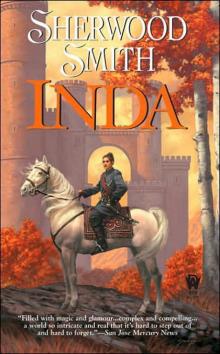 Inda
Inda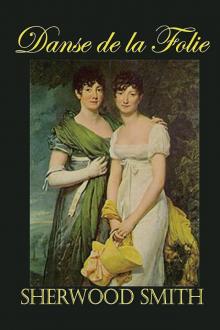 Danse De La Folie
Danse De La Folie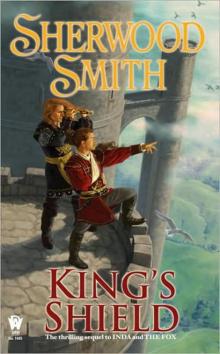 King's Shield
King's Shield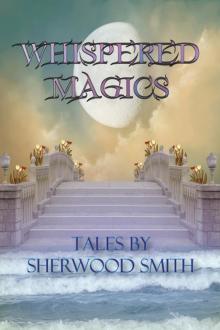 Whispered Magics
Whispered Magics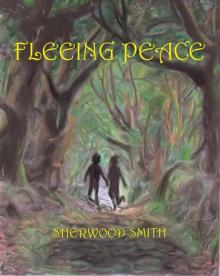 Fleeing Peace
Fleeing Peace Barefoot Pirate
Barefoot Pirate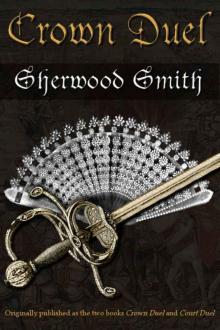 Crown Duel
Crown Duel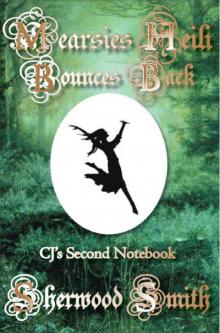 Mearsies Heili Bounces Back
Mearsies Heili Bounces Back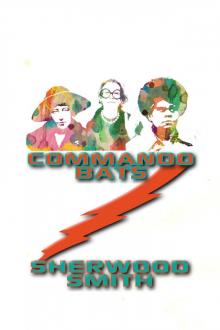 Commando Bats
Commando Bats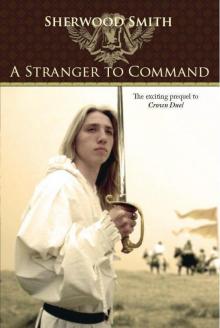 A Stranger to Command
A Stranger to Command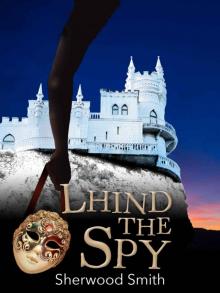 Lhind the Spy
Lhind the Spy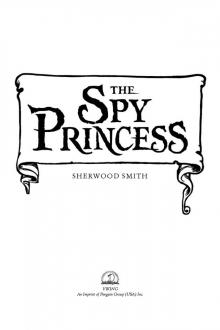 The Spy Princess
The Spy Princess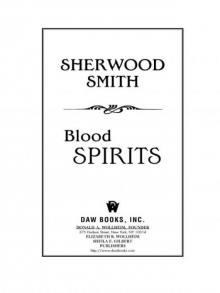 Blood Spirits
Blood Spirits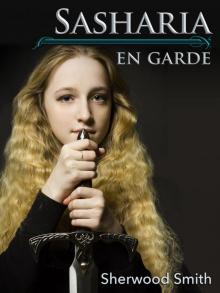 Sasharia en Garde
Sasharia en Garde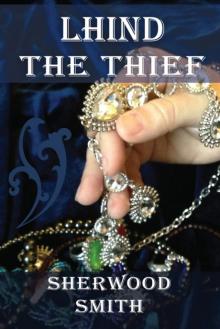 Lhind the Thief
Lhind the Thief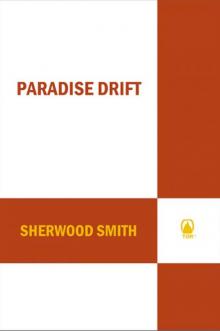 Paradise Drift
Paradise Drift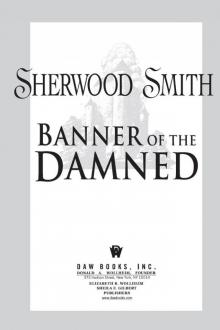 Banner of the Damned
Banner of the Damned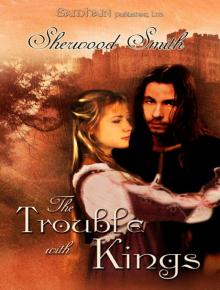 The Trouble With Kings
The Trouble With Kings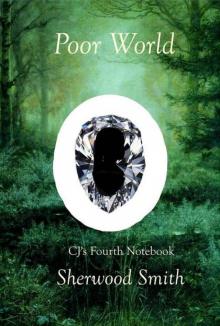 Poor World
Poor World Treason's Shore
Treason's Shore Wren Journeymage
Wren Journeymage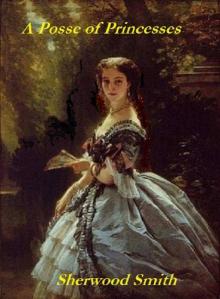 A Posse of Princesses
A Posse of Princesses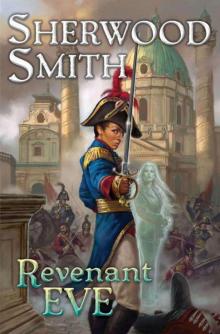 Revenant Eve
Revenant Eve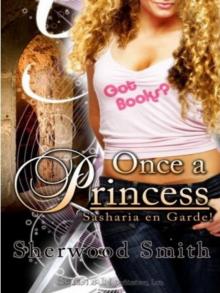 Once a Princess
Once a Princess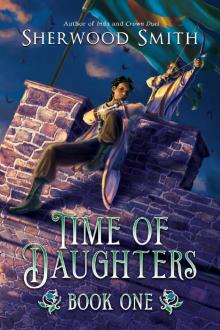 Time of Daughters I
Time of Daughters I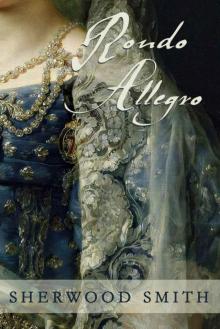 Rondo Allegro
Rondo Allegro Coronets and Steel
Coronets and Steel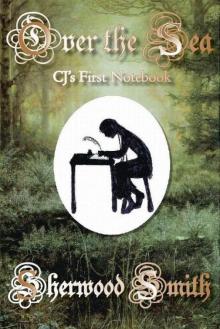 Over the Sea
Over the Sea Senrid
Senrid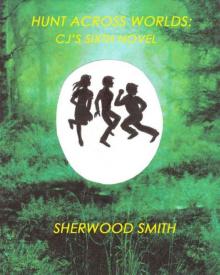 Hunt Across Worlds
Hunt Across Worlds A Sword Named Truth
A Sword Named Truth The Fox
The Fox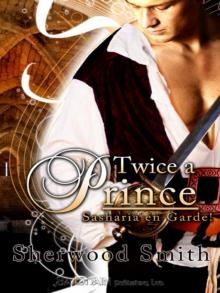 Twice a Prince
Twice a Prince Fair Winds and Homeward Sail: Sophy Croft's Story
Fair Winds and Homeward Sail: Sophy Croft's Story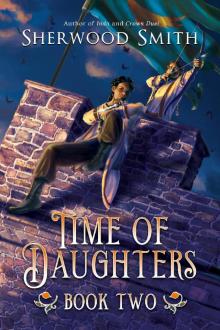 Time of Daughters II
Time of Daughters II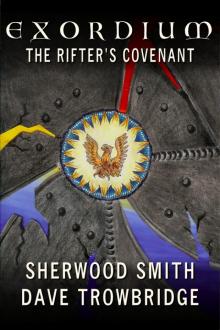 The Rifter's Covenant
The Rifter's Covenant The Phoenix in Flight
The Phoenix in Flight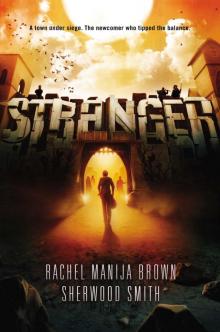 Stranger
Stranger The Thrones of Kronos
The Thrones of Kronos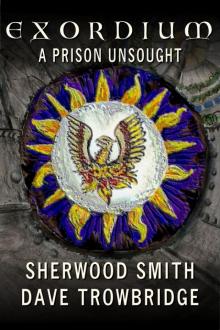 A Prison Unsought
A Prison Unsought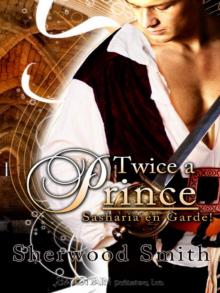 Twice a Prince: Sasharia En Garde Book 2
Twice a Prince: Sasharia En Garde Book 2